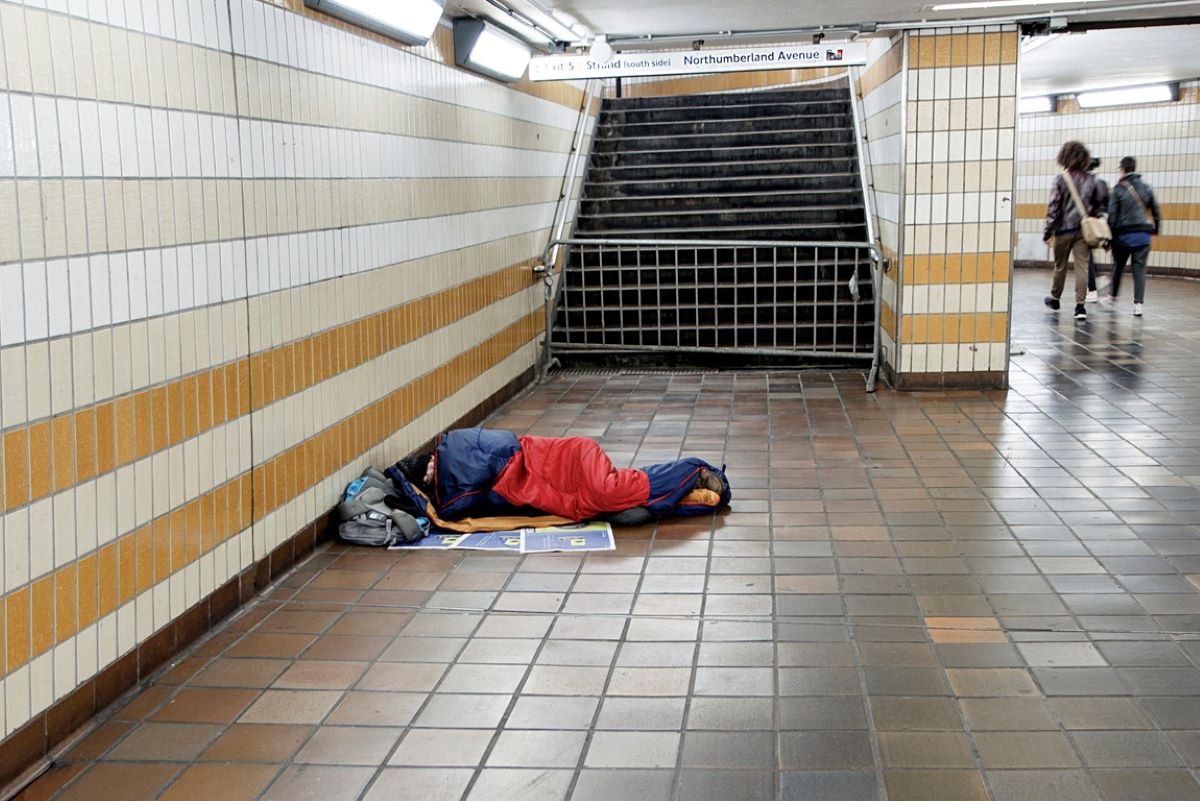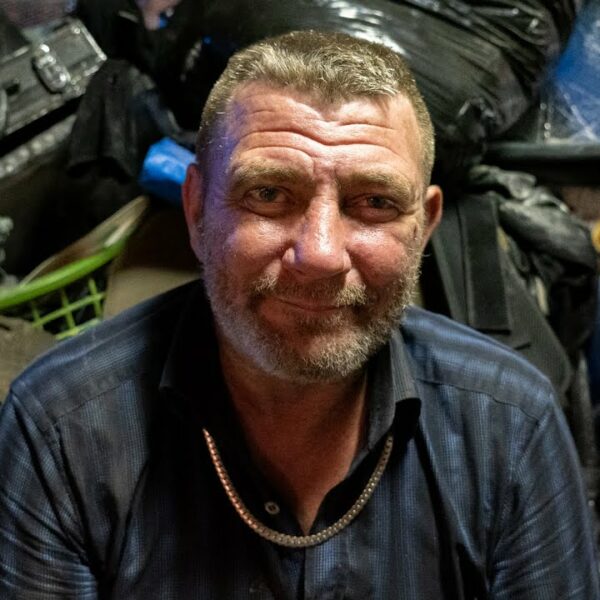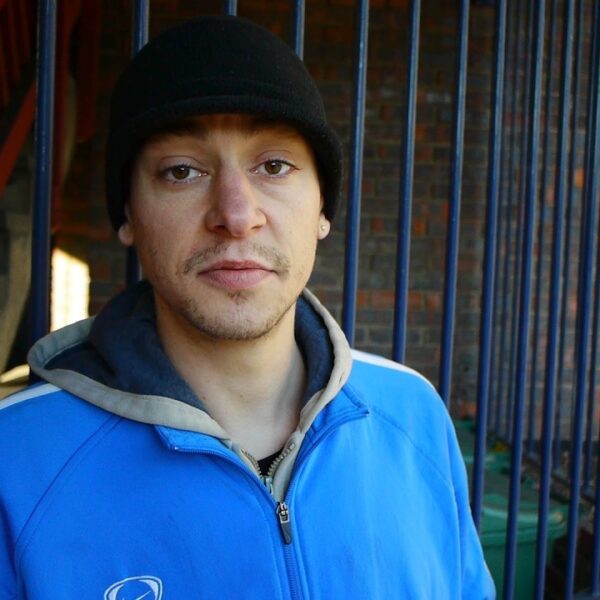A homeless man died in an alleyway near the UK Houses of Parliament in December. Just weeks after, another homeless man was issued a written warning from the Metropolitan Police. If he continued to sleep in a subway opposite Parliament, they would fine him close to 20,000 Pounds ($27,000). This is Great Britain where the response to homelessness is to move the homeless person on rather than house them.
The Metro newspaper continued, “Other rough sleepers in the area claim that similar notices have been issued to them too, with many claiming they were being ‘harassed by police’ and ‘moved on’.”
Support, don’t punish? Here’s a range of activities the UK uses not to support the most vulnerable in society but to kick them until they find another place to be invisible. Once more, I will focus on three towns close to where I live in Dorset, on the sunny South Coast of the UK.
Poole: Fines Instituted for Begging
Known for its giant natural harbour and Sandbanks, Poole is a community of mansions similar to Beverly Hills. It has some of the most expensive real estate in the world. Once it was one of the most attractive places to live in the UK. It is also one of the most polarised economically. The downtown district is run down with empty shops and real poverty problems.
If you are caught begging in Poole, you will be fined 100 Pounds ($130). There was a public outcry where 3,350 people signed a petition against the measures. However, Poole Council responded that it had run a consultation where 50% of 279 respondents had agreed with the measures. In a statement, the Council said the fines aimed to “tackle behaviours that are causing concern and distress to people in the town centre, such as aggressive begging, street drinking.”
Dorchester: Sleep Prevention Bars on Benches?
Dorchester has been a settlement for newcomers for thousands of years. Just to the south of the county town of Dorset is a Celtic fort locally known as Maiden Castle. This was there when the Romans came. They left behind their mosaics and an entertainment space now known as Maumbury Rings close to the town centre. It seems that homeless people can’t sleep at the train station now.
The Dorset Echo reported earlier this year, “’HOSTILE’ benches at a Dorchester railway station have been blasted as a ‘design against humanity’ by campaigners, who believe metal bars have been fitted to deter homeless people.”
The metal bars in question are part of a concept called “hostile architecture.” Municipalities build protrusions into places that homeless people may settle in for shelter.
Hostile Design
The UK website Hostile Design looks at the different homelessness countermeasures put in place around the world to deter people from sleeping or resting where they can be seen. The site states, “Hostile designs are designs against humanity. They are made specifically to exclude, harm or otherwise hinder the freedom of a human being. Quite often they aim to remove a certain section of a community from a public space.”
The concept of hostile design/architecture was thrust into the public eye when a massive campaign went into operation against another town council close to me. Bournemouth put homelessness bars on park benches. In the next section, we will look at Bournemouth’s activities that have used every trick in the book detailed by Hostile Design.
Bournemouth Follows the Hostile Design Bible
When you park your car at a multi-storey car park in seaside town Bournemouth and take the stairs to the exit, you may hear eerie music playing in the stairwell. It is scary to listen to and quite offensive to the ears. This is part of Bournemouth Council’s efforts to marginalise the homeless there. Recently I used a car park there and just outside, found a man with a buttonless business shirt open from the waist up in the cold rain. It was clear to me that he was outside as the countermeasures worked so well.
Essentially the countermeasure kept people from sleeping in the dry, forcing them outside. The town became famous for its hostile designs thanks to a national outcry over bars being put on park benches like the ones in Dorchester above.
Social Influence and Public Outcry
UK rapper Professor Green heard about the installed bars. Rather than talking about the problem, he went and fixed it. The Independent newspaper reported, “After travelling to Bournemouth, he filmed his friend, the designer Max McMurdo, unscrew the bolts and remove the metal bar. They then replaced it with a larger one, which he pulled a tarpaulin over, transforming the bench into a ‘homeless shelter’.”
With Professor Green’s social influence and the public outcry that ensued, the council quietly removed them. This hasn’t stopped its policy of offering homeless people one-way train tickets to their town of origin. Despite being born and raised in Bournemouth, one homeless person was offered a train ticket to Manchester. He had no connection to the city. Considering Manchester has a similar policy, he did himself out of a holiday it seems. They would have soon sent him back to Bournemouth!
The train tickets were offered as a strict reading of social housing policy rules. A council only must put someone in social housing if they have ‘local connection’ to the town or city. Under the law, the UK government states that local connection is defined as: “if they have a connection with it because: (a) they are, or were in the past, normally resident there, and that residence was of their own choice; (b) they are employed there; (c) they have family associations living there; or (d) of any special circumstances.”
Support, Don’t Punish?
Sadly, the problem – and solutions – can only be with the political will driving it.
The UK broadly has three major political parties. The Conservatives are the US equivalent of the Republicans. The Labour Party is equivalent of the Democrats. And the Liberal Democrats are aligned across the political spectrum between the far right and moderate left. Dorchester, Bournemouth, Poole and Westminster all have Conservative party leadership. So one can see the correlation between these countermeasures and local politics.
It seems only those left of the political spectrum look to support those most in need. The right seems to believe punishing the most vulnerable in society is a way forward.
Given the central government’s resources, there is no doubt social housing provisions could improve. However, the UK has been under right of centre governments continuously for the last 40 years, ever since Margaret Thatcher came to power in 1979 (including the Labour Blair and Brown governments that continued Thatcher policies). Under all such right of centre governments, low taxes are prioritised above better government services. This has fed into the current situation people face today.
Democracy is only good for those who participate in it. It seems those who participate overwhelmingly vote for the right of centre parties. If those who need change do not vote, the status quo will remain.













